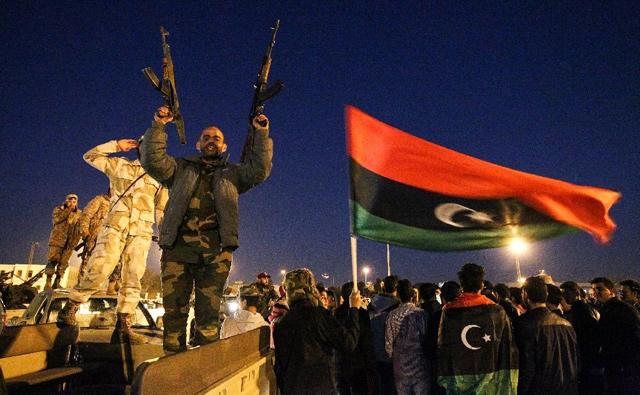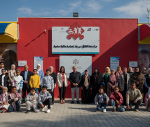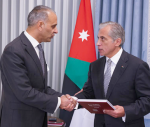You are here
UN adopts change in structure for Libya mission
By AFP - Sep 15,2020 - Last updated at Sep 15,2020

This photo shows Libyans celebrating the sixth anniversary of the Libyan revolution in Benghazi on February 17, 2017 (AFP photo)
UNITED NATIONS, United States — The UN Security Council adopted a resolution on Tuesday under pressure from the United States endorsing a change in structure for its mission in Libya, which will in the future have a special envoy and a "coordinator".
Thirteen of the 15 Council members voted for the resolution, with Russia and China abstaining.
The new structure accompanies a one-year renewal for the UN Support Mission in Libya (UNISMIL), decided after more than six months of squabbling.
It is now up to UN Secretary General Antonio Guterres to appoint people for the new roles. The resolution states that "UNISMIL should be led by a special envoy of the secretary general... with a particular focus on good offices and mediation with Libyan and international actors to end the conflict".
Under the envoy's authority, "an UNSMIL Coordinator shall be in charge of UNSMIL's day-to-day operations and management".
UNISMIL has not had a special envoy since Ghassan Salame stepped down in March for health reasons, and bickering between the United States and its partners on how the role should be defined has stalled naming a successor.
Guterres had tapped former Algerian foreign minister Ramtane Lamamra, but Washington nixed his nomination for reasons that were not made public.
The UN chief then turned to former Ghanaian minister Hanna Serwaa Tetteh but the US again rejected it, asking that the post be split in two — a political envoy and a boss for the UN mission, as is the situation for Cyprus or Western Sahara.
Washington, which has pushed for former Danish prime minister Helle Thorning-Schmidt to be the next special envoy, has been criticised by the other 14 Council members for stalling the nomination process, diplomats said.
The resolution also requests that Guterres define within the next two months "steps required to reach a lasting ceasefire" and to simultaneously provide "proposals" for possible UN "monitoring".
Finally, the text calls for "full compliance" with the arms embargo that has been in place 2011 but is regularly violated, "including by ceasing all support for and withdrawing all armed mercenary personnel" in Libya.
Peter Maurer, the president of the International Committee of the Red Cross, said in an interview Tuesday he "rather encouraged" to see political progress, even if it was "too early to assess" whether the resolution would lead to stability.
Interim British ambassador to the UN Jonathan also spoke of "positive noises" from Libya, before the Council meeting, "particularly out of both sides, calling for a ceasefire at the same time in a coordinated way".
Libya has endured almost a decade of violent chaos since the 2011 NATO-backed uprising that toppled and killed veteran dictator Muammar Qadhafi.
The UN-recognised Government of National Accord and an eastern administration led by strongman Khalifa Haftar are vying for power against a backdrop of dozens of local conflicts.
Related Articles
UNITED NATIONS, United States — The UN Security Council on Monday adopted a British-drafted resolution extending its political mission in Li
UNITED NATIONS, United States — UN Secretary General Antonio Guterres hailed "tangible progress" made in recent months in tackling Libya's a
TRIPOLI — UN envoy Martin Kobler said on Sunday his team is in contact with security officials in Tripoli to ensure that Libya's new unity g














